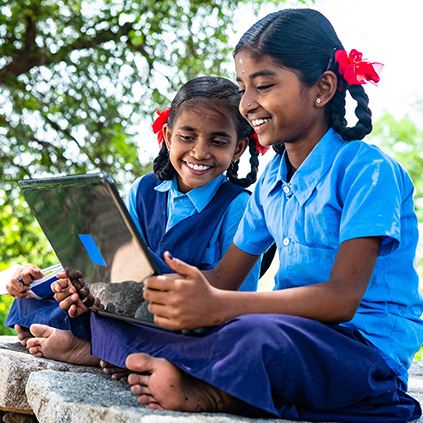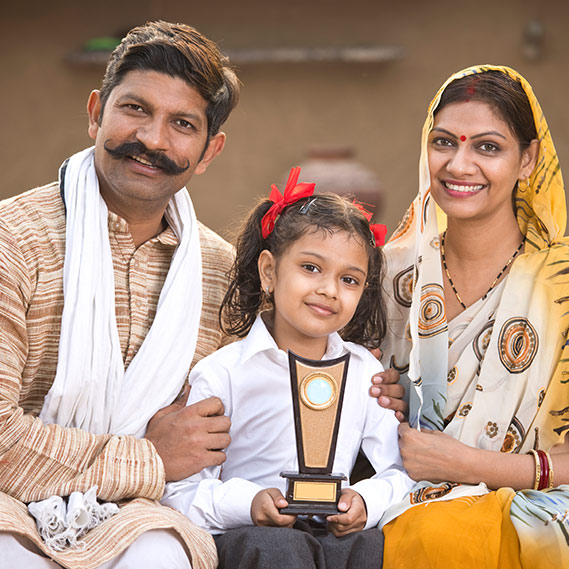TG GURUKUL’S MISSION FOR SKILL AND CAPACITY-BUILDING PROGRAMMES UNDER NEP 2020
- Assist in the goal-oriented execution of NEP 2020’s objectives across a comprehensive set of initiatives.
- Provide skill and capacity-building programmes to the underserved and digitally divided segments with certitude towards significantly enhancing student outcomes.
- Provide instant enhancement and scale to governments’ digital platforms.
- Assist in expanding and enhancing platforms and initiatives, including DIKSHA, NISHTHA, and Tamanna (Measuring Aptitude and Numerical Abilities).
- Aid in setting up blended and hybrid modes of learning ecosystems.
- Ensure alignment to the standard of content, technology, and pedagogy for online/digital teaching-learning, to be set by the NETF and other appropriate bodies.
TG GURUKUL’S UNIQUE CAPABILITIES FOR CAPACITY AND SKILL BUILDING
- TG GURUKUL’S capacity-building programme is effective and significantly less expensive than other similar ones.
- This presents the opportunity for Indian Central and State Governments to institute and expand programmes at a low cost and expect robust and tractable capacity-building across the country and all economic strata.
- The programmes are flexible and multilingual with best-in-class curricula, teachers, and technology.
- The curriculum focuses on applicability and practical areas so that students can directly utilise their knowledge by applying it to modern challenges.
- TG GURUKUL’S programmes are supplemented with core school learning programmes and professional development programmes.
- Our programmes are flexible and extensible across classes 6-11 as well as adult learners and non-traditional students and allows for meaningful collaboration and networking opportunities in a cohort-based setting.
- Our capacity-building programme provides students with the acumen they need to have confident and meaningful education.
- It is a complement to academic and core curriculums.
- The programmes are led by expert faculty and powered by experienced trainers so students can trust that they are getting industry-relevant education.
- The programme is built with career development in mind, offering fireside chats and other direct engagement opportunities with healthcare professionals.
- It leverages an online interactive learning platform, ensuring students are engaged throughout their courses and learning in stimulating and innovative ways.


Outstanding Research
- Outstanding research as a corequisite for outstanding education and development;
- TG GURUKUL’S instructors and academic heads have master’s and PhD degrees with strong research capabilities and drive towards academic and pedagogical research
No hard separations between learning areas and activities
- No hard separations between arts and sciences, between curricular and extra-curricular activities, between vocational and academic streams, etc., in order to eliminate harmful hierarchies among and silos between different areas of learning;
- TG GURUKUL is uniquely positioned and designed
Multidisciplinary and a holistic education
- Multidisciplinary and holistic education across the sciences, social sciences, arts, humanities, and sports for a multidisciplinary world to ensure the unity and integrity of all knowledge;
- TG’s diversity and flexibility are built from the ground up
- The only learning platform pan-India to have a comprehensive set of courses
Development of life skills
- Life skills such as communication, cooperation, teamwork, and resilience;
- TG GURUKUL’S curriculum is being expanded to address the capacity-building initiative across 15 skills and career paths
Ethics and human & Constitutional values
- Ethics and human & Constitutional values like empathy, respect for others, cleanliness, courtesy, democratic spirit, spirit of service, respect for public property, scientific temper, liberty, responsibility, pluralism, equality, and justice;
- Practical aspects of this goal will be addressed in schools’ physical locations
- TG GURUKUL’S curriculum has all other aspects included in the learning paths
Emphasis on conceptual understanding
- Emphasis on conceptual understanding rather than rote learning and learning-for-exams
- TG GURUKUL’S curriculum is designed from the ground up for conceptual understanding and critical thinking
Extensive use of technology
- Extensive use of technology in teaching and learning, removing language barriers, increasing access for Divyang students, and educational planning and management;
- TG GURUKUL’S technology platform is multilingual, internally scalable, secure, self-contained, and best-of-breed across the world
- The only learning platform pan-India to have a comprehensive set of courses
NEP 2020 Guidelines on capacity building
- For Teachers
- 50 hours of CPD (continuous professional development) for teachers as per para 5.15 and 5.16 of NEP.
- Competency-based education and assessment reforms (NEP para 4.6)
- Online courses on DIKSHA, PISA competency training, etc., for teachers. (NEP para 3.4)
- FLN (Foundational Literacy and Numeracy) - by Grade 3. However, if any courses are launched for Grades 6 to 8, learning levels for students should be checked for proper alignments.
- For Students
- Supplementary aid from authentic and trusted Educators/Organisations…courses based on:
- ICT usage
- Aptitude
- English speaking and listening skills
- General knowledge about India as a country and local regions of habitat, etc.
- AI, ML
- Financial literacy
- Design thinking
- Various vocational courses on beauty and wellness
- Understanding what organic produces in agriculture are
- Food habits & source of nutrition. Build balanced diets, how to switch to healthy junk food, etc.
- Supplementary aid from authentic and trusted Educators/Organisations…courses based on:
Objectives
- Develop a global mindset by instilling Skills and Values in Education, which help in capacity building.
- Recognising, identifying, and fostering the unique capabilities of students.
- Encourage logical decision-making, critical thinking, problem-solving, and innovation.
- The main objective of these modules is to develop readiness for understanding and appreciating various skills and their application in students’ work careers.
- These courses include a planned sequence of instructions – consisting of units aimed at developing employability and vocational competencies of students of classes 6-8 who opt for vocational subjects, in addition to their general school curriculum.
TG GURUKUL mission in executing NEP 2020
| Sr. # | NEP 2020 Goals | TG Capabilities |
|---|---|---|
| 1 | Recognizing, identifying, and fostering the unique capabilities of each student by sensitizing teachers and parents to promote each student’s holistic development in both academic and non-academic spheres. | |
| 2 | According the highest priority to achieving Foundational Literacy and Numeracy by all students by Grade 3. | |
| 3 | Flexibility, so that learners have the ability to choose their learning trajectories and programmers, and thereby choose their own paths in life according to their talents and interests. | |
| 4 | No hard separations between arts and sciences, between curricular and extra-curricular activities, between vocational and academic streams, etc., in order to eliminate harmful hierarchies among and silos between different areas of learning. | |
| 5 | Multidisciplinary and holistic education across the sciences, social sciences, arts, humanities, and sports for a multidisciplinary world to ensure the unity and integrity of all knowledge. | |
| 6 | Emphasis on conceptual understanding rather than rote learning and learning-for-exams. | |
| 7 | Creativity and critical thinking to encourage logical decision-making and innovation. | |
| 8 | Ethics and human & Constitutional values like empathy, respect for others, cleanliness, courtesy, democratic spirit, spirit of service, respect for public property, scientific temper, liberty, responsibility, pluralism, equality, and justice. | |
| 9 | Promoting multilingualism and the power of language in teaching and learning. | |
| 10 | Life skills such as communication, cooperation, teamwork, and resilience. | |
| 11 | Focus on regular formative assessment for learning rather than the summative assessment that encourages today’s ‘coaching culture.’ | |
| 12 | Extensive use of technology in teaching and learning, removing language barriers, increasing access for Divyang students, and educational planning and management. | |
| 13 | Respect for diversity and the local context in all curriculum, pedagogy, and policy, always keeping in mind that education is a concurrent subject. | |
| 14 | Full equity and inclusion as the cornerstone of all educational decisions to ensure that all students are able to thrive in the education system. | |
| 15 | Synergy in curriculum across all levels of education, from early childhood care and education to school education to higher education. | |
| 16 | Teachers and faculty as the heart of the learning process – their recruitment, continuous professional development, positive working environments and service conditions. | |
| 17 | A ‘light but tight’ regulatory framework ensures integrity, transparency, and resource efficiency of the educational system through audit and public disclosure while encouraging innovation and out-of-the-box ideas through autonomy, good governance, and empowerment. | |
| 18 | Continuous review of progress based on sustained research and regular assessment by educational experts. |
– Universally Capable Across All Geographies
– Regional Capability With Required Customization